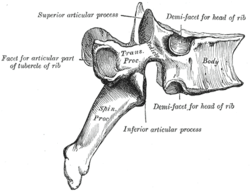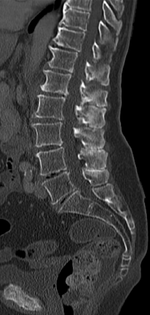Baastrup's sign
Baastrup's sign, or kissing spine, is an orthopedic and radiographic disorder that often occurs in elderly humans. It is characterized by enlargement of the posterior spinous projections of the lumbar spine, with normal intervertebral disc height and neuroforamina. The reason it is referred to as kissing spine is because the posterior spinous processes 'kiss' and touch one another as the individual goes into lumbar extension, for example when flat on their stomach.[1][2][3] The condition has been seen in humans, canines, particularly with boxer breeds,[4] and certain breeds of horses.[5] This disorder is named after Christian Ingerslev Baastrup.
Diagnosis

A diagram of a human vertebral body. With Baastrup's sign, the posterior spinous process, pointing down and to the left, is abnormally thickened due to repetitive microtrauma.
The salient feature of the disorder is the exuberant osteophytosis that occurs at posterior lumbar spinous processes. Osteophytes are coarse calcifications at the edges of bone that form due to repetitive stress and trauma. There is also atrophy and fatty replacement of paraspinal musculature, which can be detected by CT or MRI.[6]

Sagittal CT of the lumbar spine showing Baastrup's sign. The posterior spinous processes are the abnormally dense bone structures on the right of the image.
Treatment
The malpositioning seen on radiography may not cause any symptoms at all. If there are related symptoms, however, therapeutic options include physical therapy and nerve block injections. As a last resort, decompressive laminectomy may be attempted to relieve pain symptoms and remove the abnormally enlarged portions of bone.[7]
References
- ↑ "Who named it - Baastrup's sign".
- ↑ N.K. Shyam Kumar D.M.R.D, D.N.B. "Baastrups Disease An Unusual Cause Of Backpain: A Case Report". The Internet Journal of Radiology. 2005 Volume 4 Number 1.
- ↑ Lin, E. (2008). "Baastrup's disease (kissing spine) demonstrated by FDG PET/CT". Skeletal radiology 37 (2): 173–175. doi:10.1007/s00256-007-0379-2. PMID 18087748.
- ↑ "Medical Dictionary Online - Baastrup's".
- ↑ "Horse and Hound: Explaining kissing spines".
- ↑ Haig, A.; Harris, A.; Quint, D. (2001). "Baastrup's disease correlating with diffuse lumbar paraspinal atrophy: a case report". Archives of physical medicine and rehabilitation 82 (2): 250–252. doi:10.1053/apmr.2001.18052. PMID 11239319.
- ↑ "Baastrup's Disease - General Practice Notebook".
|
|---|
| | Deforming | |
|---|
| | Spondylopathy | |
|---|
| | Back pain | |
|---|
| | Intervertebral disc disorder | |
|---|
| |
|---|
| | Description |
- Anatomy
- head and neck
- cranial
- arms
- torso and pelvis
- legs
- bursae and sheathes
- Physiology
|
|---|
| | Disease |
- Arthritis
- acquired
- back
- childhood
- soft tissue
- Congenital
- Injury
- Symptoms and signs
- Examination
|
|---|
| | Treatment |
- Procedures
- Drugs
- rheumatoid arthritis
- gout
- topical analgesics
|
|---|
|
|

